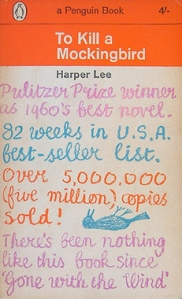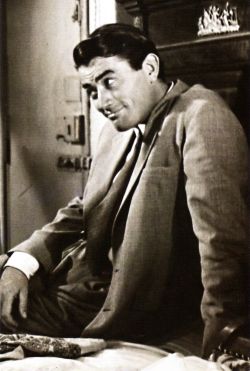 It’s a sin to kill a mockingbird [..] They don’t do one thing but sing their hearts out for us.
It’s a sin to kill a mockingbird [..] They don’t do one thing but sing their hearts out for us.
Thanks to a bookcrossing book ring I have finally read Harper Lee’s 1960 classic To Kill a Mockingbird. It had been on my wishlist for quite a few years and became part of two challenges: the 2009 Classics Challenge and my personal 2008-2009 challenge. There has been written a lot about this book so I’m just going to add my personal view. Well.. and a little about the story for people who haven’t read it (yet).
To Kill a Mockingbird is a novel in which a female attorney, Jean Louise — Scout — Finch, looks back on her childhood during the Great Depression in the fictional town of Maycomb, Alabama.
Maycomb was an old town, but it was a tired old town when I first new it. In rainy weather the streets turned to red slop; grass grew on the sidewalks, the court-house sagged in the square. Somehow, it was hotter then: a black dog suffered on a summer’s day; bony mules hitched to Hoover carts flicked flies in the sweltering shade of the live oaks on the square. Men’s stiff collars wilted by nine in the morning. Ladies bathed before noon, after their three o’clock naps, and by nightfall were like soft tea-cakes with frostings of sweat and sweet talcum.
People moved slowly then. They ambled across the square, shuffled in and out of the stores around it, took their time about everything. A day was twenty-four hours long but seemed longer. There was no hurry, for there was nowhere to go, nothing to buy and no money to buy it with, nothing to see outside the boundaries of Maycomb County. [p.11]
The story focusses on the events of a certain summer, that morally and socially shaped Louise into the adult she became. Because of this, the book is considered a Bildungsroman. Although Harper Lee used a lot of autobiographical elements, the novel is fiction.
 I am very glad I got to read the book. I don’t think it will end up in my 2009 top 5 list, but it was a quick, entertaining read: the story immediately grabbed me and I liked the atmosphere of doom, suggesting that ‘something was going to happen’. The first paragraph sets the tone:
I am very glad I got to read the book. I don’t think it will end up in my 2009 top 5 list, but it was a quick, entertaining read: the story immediately grabbed me and I liked the atmosphere of doom, suggesting that ‘something was going to happen’. The first paragraph sets the tone:
When he was nearly thirteen, my brother Jem got his arm badly broken at the elbow. When it healed, and Jem’s fears of never being able to play football were assuaged, he was seldom self-conscious about his injury. His left arm was somewhat shorter than his right; when he stood or walked, the back of his hand was at right -angles to his body, his thumb parallel to his thigh. He couldn’t have cared less, so long as he could pass and punt.
When enough years had gone by to enable us to look back on them, we sometimes discussed the events leading to his accident.
The reader now knows that the rest of the book will tell about the events leading up to Jem’s accident. But like in a court case where seperate witnesses have different truths, the sibling’s have different points of view on where it all began.
In my online Boekgrrls book group there was some discussion whether or not the quote above contains vivid imagery. I think so ;) Some people didn’t find it evocative — worse, they thought it gawky because they had to physically try the position of the arm. I rather like it that everywhere around the world and through time, people are swinging their arms while reading ;)
Some women also didn’t find it believable that children were accepted into the courtroom. Well, it was a long time ago… And honestly, isn’t it really harder to believe that black people were treated as lesser humans? And they were! Even though you know that it’s true, it is still shocking to read about this kind of racism. To Kill a Mockingbird was published 5 years after Rosa Parks had refused to give up her bus seat for a white passenger (also in Alabama); Harper Lee had been writing on the book for a few years.
Aside from the main storyline (which I am not writing down because it is broadly known and when you’re in the dark about it you might want to keep it that way), you can feel how Scout grows into her later profession even though that was not yet common for women of that time.
“There are lots of reasons. For one thing, Miss Maudie can’t serve on a jury because she’s a woman –”
“You mean women in Alabama can’t –?” I was indignant.
“I do. I guess it’s to protect our frail ladies from sordid cases like Tom’s. Besides,” Atticus grinned, “I doubt if we’d ever get a complete case tried — the ladies’d be interrupting to ask questions.”
Jem and I laughed. Miss Maudie on a jury would be impressive. I thought of old Mrs. Dubose in her wheelchair — “Stop that rapping, [judge] John Taylor, I want to ask this man something.” Perhaps our fore-fathers were wise. [p.225]
After Jem and his sister have sneaked out to watch the court case, some Southern ladies tease Scout afterwards:
“Watcha going to be when you grow up, Jean Louise? A lawyer?”
“Nome, I hadn’t thought about it..” I answered, grateful that Miss Stephanie was kind enough to change the subject. Hurriedly I began choosing my vocation. Nurse? Aviator?
“Well…”
“Why shoot, I thought you wanted to be a lawyer, you’ve already commenced going to court.”
Recently To Kill a Mockingbird became #1 on the list of the best 60 books of the past 60 years. Maybe not because Harper Lee is the most skilled writer of recent history, but because her book is about the equality of Man.
“Well how do we know we ain’t Negroes?”
“Uncle Jack Finch says we really don’t know. He says as far as he can trace back the Finches we ain’t, but for all he knows we mighta come straight out of Etiopia durin’ the Old Testament.”
“Well if we came out durin’ the Old Testament it’s too long ago to matter.”
“That’s what I thought,’ said Jem, ‘but around here once you have a drop of Negro blood, that makes you all black [..]” [p. 165]
John Sutherland remarks in his article about the list of 60 books:
“[..] as Henry James said, the house of fiction has many rooms. One important room is reserved for fiction that expresses the basic ideals of its time: such as Oliver Twist, or The Grapes of Wrath. To Kill a Mockingbird will always have a high place in that company.”
 Ha! I have just finished John Steinbeck‘s The Grapes of Wrath, which is also on my challenge list (review pending). That book is more about equal rights for ‘poor’ white people from the East of the US migrating to the West in the same period as To Kill a Mockingbird. Both books won the Pulitzer Prize for Fiction in the year after they were published (respectively 1940 and 1961). And both books play in the American South.
Ha! I have just finished John Steinbeck‘s The Grapes of Wrath, which is also on my challenge list (review pending). That book is more about equal rights for ‘poor’ white people from the East of the US migrating to the West in the same period as To Kill a Mockingbird. Both books won the Pulitzer Prize for Fiction in the year after they were published (respectively 1940 and 1961). And both books play in the American South.
Have you ever heard of Southern Gothics, a sub genre of the gothic novel and unique to American literature? I hadn’t. But To Kill a Mockingbird is (by some) considered to belong to this genre.
“Like its parent genre, it relies on supernatural, ironic, or unusual events to guide the plot. Unlike its predecessor, it uses these tools not for the sake of suspense, but to explore social issues and reveal the cultural character of the American South.
[..] the writer takes classic Gothic archetypes, such as the damsel in distress or the heroic knight, and portrays them in a more modern and realistic manner — transforming them into, for example, a spiteful and reclusive spinster, or a white-suited, fan-brandishing lawyer with ulterior motives.”
Lawyer. Heroic knight. That’s why Atticus, Scout’s father, seems a bit too good to be true sometimes! But I think it is also because most of the story is told through the eyes of a child — don’t young girls often look up to their fathers, seeing them as hero’s?
 I had to think about my father a lot whilst reading this book. He was a great fan of Gregory Peck, who played Atticus in the 1962 movie adaptation. But he was also born in the same year as Harper Lee and had a huge sense of morality, of justice. He would have liked to become a lawyer. Hee hee, maybe he even looked a little bit like Gregory Peck ;)
I had to think about my father a lot whilst reading this book. He was a great fan of Gregory Peck, who played Atticus in the 1962 movie adaptation. But he was also born in the same year as Harper Lee and had a huge sense of morality, of justice. He would have liked to become a lawyer. Hee hee, maybe he even looked a little bit like Gregory Peck ;)
I couldn’t help but think of another film as well: Mississippi Burning. Some marvelous actors playing in it: Gene Hackman, William Dafoe, Frances McDormand (I’ll leave it to you to look them up if you don’t know them ;) I would definitely like to see that movie again soon! I don’t feel the need to see To Kill a Mockingbird. But I liked reading this classic enough to want to have a copy of my own. I’ll be on the lookout for a nice edition! :)
Mockingbird sound recording courtesy of The Quomma.



8 reacties
Comments feed for this article
zondag 18 oktober 2009 bij 15:32
Diana
Thanks for these reviews, I realised while reading your blog, how interesting it is to take part at a reading challenge / group. I am thinking of joining the japanese literature read along to give it a try. Did you read the book/started reading it ?
maandag 19 oktober 2009 bij 16:07
gnoegnoe
I haven’t read the books for my online Japanese bookgroup reads yet but they are waiting on my shelf! First I picked up a recent Japanese novel: Be With You, by Takuji Ichikawa. It’s an easy read (as far as I got at least) and I love it.
When I’ve finished Ichikawa I will start Part 1 of The Cat (which has to be finished by November 15th) and then The Old Capitol (to be read by November 30th).
Maybe I should get away from my pc and read!
dinsdag 20 oktober 2009 bij 22:52
Trish
The last bit about thinking about your father reminds me a bit of the movie Vanilla Sky with Tom Cruise (not really related to TKAMB but Atticus does come up). Anyway, glad you enjoyed it. I need to read this one again!
woensdag 21 oktober 2009 bij 18:00
gnoegnoe
It’s been so long ago I saw Vanilla Sky that I can’t remember a thing about Atticus coming up in it…
vrijdag 18 december 2009 bij 14:39
Whitney
This book is fantastic and so beautifully written! Did you know the character Dill was based on Truman Capote? He and “Nelle” Harper Lee were childhood friends, Capote also passed To Kill A Mockingbird onto his publisher. Thanks for the review it was great!
dinsdag 22 juni 2010 bij 13:53
Bookie Mee | To Kill A Mockingbird by Harper Lee
[…] reviewed by Rebecca Reads | Serendipity | Graasland | Booklust | The Reading […]
zaterdag 22 januari 2011 bij 03:51
Through the eyes of a innocent girl (Double reviews of To Kill a Mocking Bird and A Crime in the Neighbourhood) « Bibliojunkie
[…] Graasland […]
maandag 21 februari 2011 bij 17:20
Novroz
Thanks for linking to this post, Gnoe :)
I enjoy reading your perspective…it’s nice to know that someone else is sort of in the same page with me. Just like the sentence you’ve highlighted…It is a nice read but won’t made it into my top5 list as well.